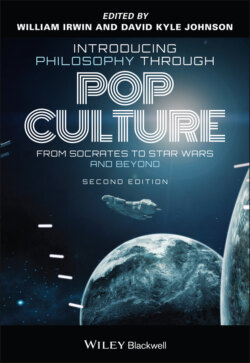Читать книгу Introducing Philosophy Through Pop Culture - Группа авторов - Страница 11
Оглавление
Introduction
Philosophy has a public relations problem. Just the sound of the word “philosophy” scares a lot of people, conjuring images of long‐dead Greeks and crusty old professors. But the stereotypes of philosophy are just that – stereotypes. They are mistaken exaggerations and overgeneralizations. Some philosophy professors may be egg‐headed, ivory‐tower intellectuals, but most are not. In fact, many philosophy professors like the same things you like: television, movies, music, and video games. We see connections between these elements of pop culture and philosophy. So this book, written by philosophy professors, takes you from pop culture to philosophy; we wade into the water before swimming out deep. Each chapter in this new edition focuses on a piece of pop culture, like Harry Potter, Star Wars, or Wonder Woman, and teaches you about a particular issue in philosophy. We think you'll agree that, to paraphrase a classic Disney truism, a spoonful of pop culture helps the philosophy go down.
The idea of using examples to facilitate learning is not new to philosophy. Famously, Plato (428–348 BCE) used the story of the ring of Gyges, and Descartes (1596–1650) imagined a deceitful demon. However, most examples in philosophy are rather dry – finding people with bland names like Jones and Brown in difficult to describe circumstances, such as those in which we are potentially justified in believing that “Jones owns a Ford, or Brown is in Barcelona.” Thankfully, Hollywood writers do a much better job of creating engaging, imaginative scenarios than philosophers do. So why not use their creations to add spice to philosophy? As you'll discover in this book, The Matrix provides a vivid way of picturing Descartes's concerns about deception and knowledge, and South Park hilariously dramatizes the problem of evil by asking why good things (like inheriting a million dollars) happen to bad people (like Cartman). Indeed, many other insightful philosophical illustrations from pop culture await your reading.
Now, of course, you may be concerned that you're in trouble because in addition to being clueless about philosophy you're also clueless about The Matrix and South Park. There's no need to worry. You don't have to be an expert on Marvel movies or to have seen every episode of The Good Place to benefit from this book. Even a passing acquaintance with the pop culture icon discussed in any given chapter will be enough for you to learn the philosophy to which it is connected. You can get that easily enough on the internet. In fact, you can visit the website for this book at https://introducingphilosophythroughpopculture.com for all kinds of helpful up‐to‐date links.
In sum, this book is intended to make initial connections between pop culture and philosophy that will pique your interest in the latter and lead you to study and appreciate the subject more deeply. Maybe you'll even decide to tell your friends that philosophy has gotten a bad rap. Certainly, we believe you'll find that philosophy is relevant, fun, and exciting.1
Note
1 1 For pop culture resources and philosophical resources related to all chapters please visit the website for this book: https://introducingphilosophythroughpopculture.com.
